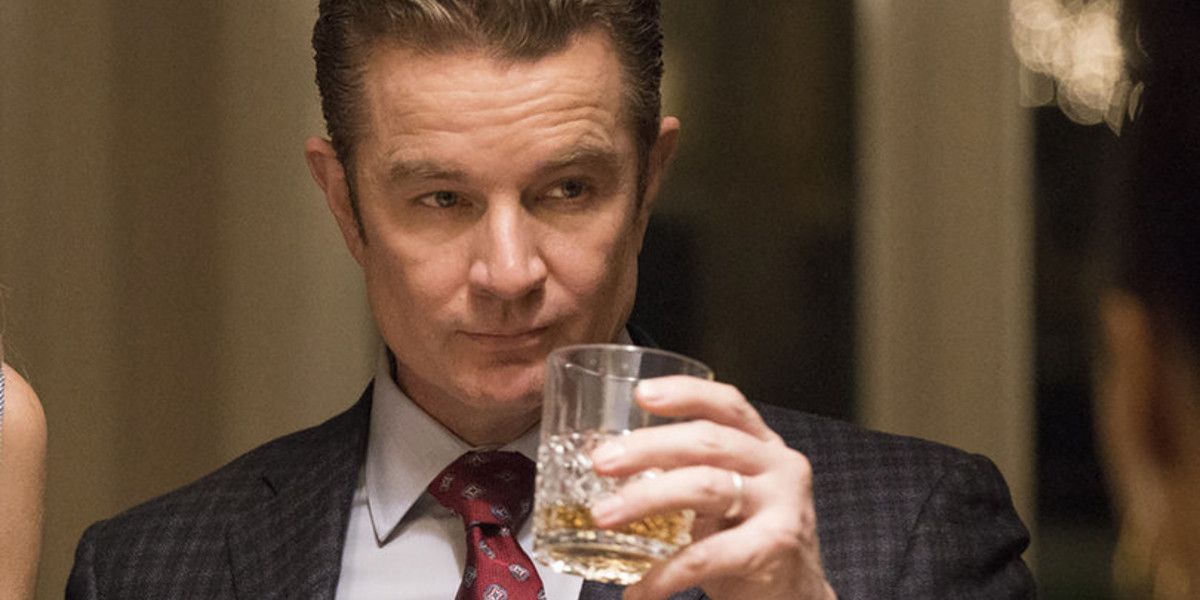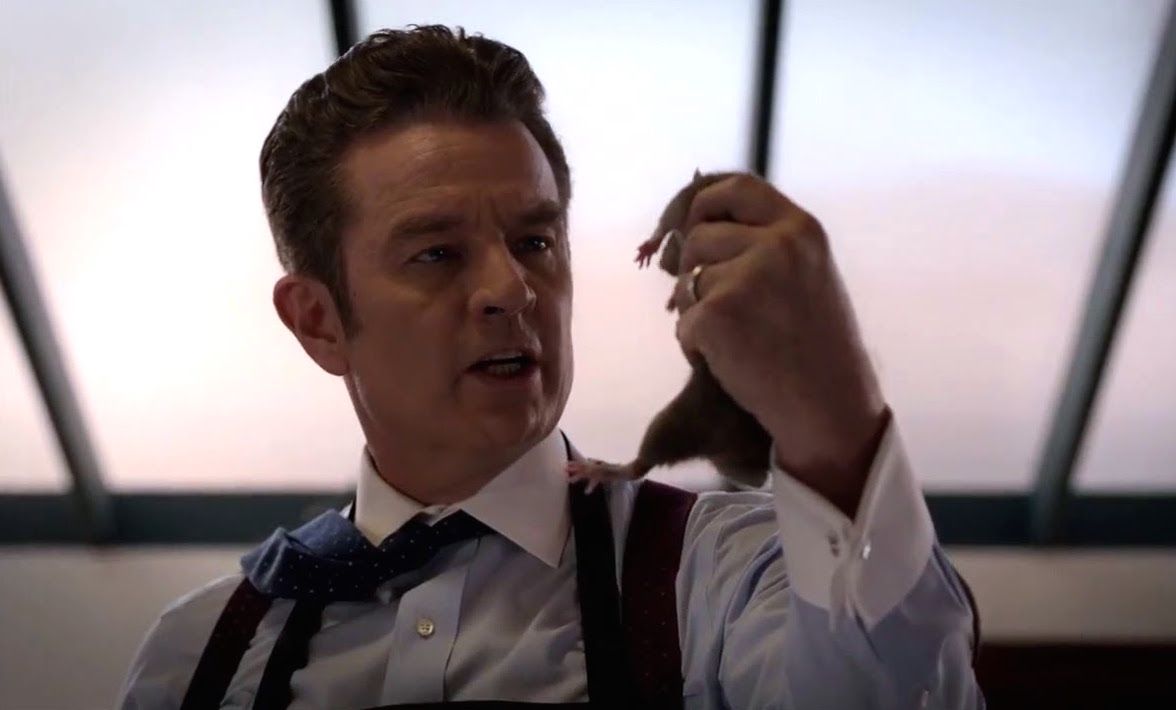The Museum of Pop Culture in Seattle -- colloquially known as MoPOP -- launched an extensive new exhibit, "Marvel: Universe of Super Heroes," late last month. The two-level show hosts some of the rarest comics in the world alongside some of Marvel Cinematic Universe’s coolest costumes. The grand opening was attended by a number of special guests including G. Willow Wilson (co-creator of Kamal Khan/Ms. Marve), Ann Nocenti (co-creator of Longshot), filmmaker Kevin Smith and genre TV vet James Marsters.
Whether you’re a fan of Buffy the Vampire Slayer, Smallville, DC and Marvel’s animated fare, the Metal Hurlant Chronicles series, or the recent live action adaptation of Runaways, you likely love to hate Marsters. Taking on villainous roles such as Spike, Piccolo, Brainiac, Lex Luthor, Korvac and, most recently, Marvel's Runaways' Victor Stein, he spent a good portion of his career playing the intelligent, ruthless type.
RELATED: Cloak & Dagger Showrunner Wants Crossover With Runaways
CBR sat down with the geek icon at MoPOP's opening event and ask him a few questions. While he may be good at portraying bad, Marsters is amiable and funny in person, and answered whatever was thrown at him with true candor.
CBR: I want to start with Dragon Ball. You were, of course, in the live action Dragonball Evolution movie from 2009, but there’s persistent rumors that you recently voiced Zamasu in the Dragon Ball Super series and the Dragon Ball FighterZ video game as well.
James Masters: I was just in the movie, which was not exactly what I was hoping for. I remember my son was so excited. He didn’t care about any of the roles that I ever did, but then when I got [cast as] Piccolo, he was like, “You rock! You’re amazing!” He was like nine or 10 or 11, [around] that age, and it’s opening weekend and he’s leading my daughter and me. He’s running ahead into the theater and I’m like, “Slow down, son.” He runs into the theater, and as I walk into theater I’m thinking, “Just give us half a house, Lord… just half a house. We’ll build with word of mouth.” And I get in there and it’s packed. There’s no seats. It’s amazing. It’s all older brothers with their younger brothers together.
We all sit down and suddenly my head says this is too good to be true. So, I turn to this 13 year old next to me and I go, “Is this Dragon Ball?” And he goes, “What?” And ask again, “Is this Dragon Ball?” He goes, “No, man, this is The Fast and the Furious!” So, I had to get my kids up and walk the daddy walk of shame across the hallway. Then, I’m like, “Lord, just a quarter of a house… just a quarter of a house.” We walk in there and including us three, there is five people… on opening night. It’s probably for the best that not a lot of people saw it.
Ouch!
Yeah, they told me it was a $120 million dollar picture and that Steven Chow was producing. Steven Chow who did Kung Fu Hustle.
And Shaolin Soccer!
I usually say that too, but most people only ever know Kung Fu Hustle. So, I get to Durango, Mexico and it’s a $30 million picture and Steven Chow was just on paper to fool us down to Durango, Mexico. Chow Yun Fat and I were cursing in the desert over this like, “Son of a bitch!”
So, you weren’t in the recent Dragon Ball series and video game?
There’s a lot of rumors going on. I should stoke the rumors. So, yeah, no comment. I can’t talk about that. That’s cool, [getting to use] “no comment.”
One of the best aspects of the Runaways show is how it took a great concept and expanded on it. How did you feel about how they adapted the source material?
I can’t speak to the source material. I did a French show based on Metal Hurlant, which was the French comic book that gave birth to Heavy Metal, and I did read the short story that my episode was based on. And what happened is, I ended up doing an impersonation of the character that was portrayed on the page. And I was like, I don’t want to do that again. I want to just trust that the producers know the source material really well, and I’m just going to go in with instinct. I’m going to go to them with all my ideas and they can tell me if they’re right or wrong. It’s getting weird because I’m guessing what’s happening…I can tell what my character would do.
We’re filming the very first episode and we’re all around the coffee machine, and I’m like, “What happens if this teenager goes in the box and it doesn’t work? What if we don’t kill her? What do we do then?” And the other parents are like, “That’s a really interesting ethical choice.” And I’m like, “No, it isn’t. We f*cking kill her. Jesus! We already decided to kill her before. You just choke her out. She’s a witness now. Guys, come on.” The producers, Josh [Schwartz] and Stephanie [Savage], were like, “You’re scaring me. You’re so much like Victor. Victor is a killer. Wow.” And I’m just like, “I’m just in character, I’m a nice person.”
Page 2: [valnet-url-page page=2 paginated=0 text='Why Runaways resonates with audiences, exploring real-life science']
What is it about the Runaways story that you think resonates with audiences?
The thing that I think you can run with for a long time, and this is something that one of the other producers Quinton [Peeples] was talking to me about, is this gulf that opens up between the generations. I personally started lying to my kids when they were three [years old]. I told them there’s a Santa Claus. I’ve lied to them so many times because I couldn’t tell them why I was upset. I couldn’t tell them that the doctor said that I might have melanoma. I couldn’t say that I can make the mortgage this month but next month is looking a little dicey. There is so many things that a healthy parent would never say. But kids are smart enough to know that you are not being completely truthful. And if you’re a good parent, there’s this gulf that opens up and it’s tragic, but it’s unavoidable. So, Runaways turns that up to 11.
There’s a lot of parents who have jobs that they may not agree with, that may be making a product that they don’t believe in. But they have to feed their kids. They are making a high moral choice to give up some of their own morality so that they can be of service to their kids. The Pride are actually fighting for the future of the Earth…and they’re killing people to do it. How do you deal with that as a young person? How do you deal with the time of life where you see your parents clearly? When you’re old enough that the lies don’t work anymore and you can actually see them. How do you get out from underneath that? What do you do in the face of that? That’s a long process that usually only ends…it only ended for me when I became a parent myself. So, until I was 34 years old, I was still climbing out of what my parents had created. So, that is a theme you can run with for quite a long time.
You are scientist Victor Stein on the show, but you are also into science in real life. What are your areas of interest?
I’m interested in the fallacy of a grand unified theory. I really don’t believe that it is worth it to pursue a theory of everything. We don’t really have a standard model that is set in stone. Every time the Large Hadron Collider smashes some more particles, I’m always reading: May upend physics. Standard model is back in question. Even the big stuff we pretty much understand, is not really locked down and completely understood. Then, on the other hand, you have quantum physics, and a scientist will tell you, if you think you understand quantum physics, you don’t understand quantum physics. Trying to find a theory that explains both seems like a fool’s errand.
String Theory I have a real problem with, because it has nothing to do with science. It is tantamount to mathematic philosophy. I’ve talked to mathematicians about this and they’re like, “Yeah.” The scientific method is: you observe something that is happening, you theorize about why, you devise an experiment to test your theory, then you observe the experiment, and if you can’t prove yourself wrong, you might have something. You publish your results. Other people have to replicate that. Et cetera. So, observation is key to science and we can’t observe strings. There is nothing about String Theory that is observable. So, it’s really a bunch of chalk on the chalkboard. Every time that we’ve divorced ourself from observation, we’ve made some mistakes somewhere.
RELATED: Marvel Museum Exhibit Celebrates All Aspects of the Superhero Universe
Any reading suggestions?
The Purpose-Guided Universe is a great book by an astrophysicist out of the University of Arizona, Bernard Haisch, who argues for the existence of a creative force behind the creation of the universe based on science, not on faith. He says that there are 34 things about the physics of the Big Bang that if they were any different, any at all, intelligent life couldn’t have formed. The way the periodic table is laid out so that complex molecules can be belched out of stars. The strength of gravity relative to the other forces. If it was any stronger, the universe would have collapsed already. If it was any weaker, stars couldn’t form and belch out those complex molecules that are essential for life.
Carl Sagan talked about how lucky we were in the cosmos back in the ‘60s, but Bernard Haisch said, “Look, we have the computers to run the numbers and I’m going to tell you the percentage chance that this is a coincidence. He’s like, “Look, scientifically speaking, it’s ludicrous to call that a coincidence.” So, scientifically speaking, the odds that this universe was finely designed to produce intelligent life, very high. The chance that has anything to do with Earthly religion, very low.


